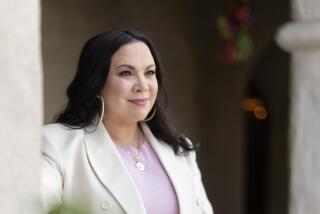‘12 Angry Men’ are more than just mad at Pasadena Playhouse
One of Barack Obama’s most heartfelt moments as president and the vitriol of online bigots contributed to director Sheldon Epps’ decision to put a new twist on “12 Angry Men” at the Pasadena Playhouse.
Using casting as a bullhorn, he’s turned the mid-1950s chestnut about tense deliberations in a jury room into a forum on black-white relations.
The Obama moment that inspired Epps, the playhouse’s longtime artistic director, was the president’s speech last July after the acquittal of Trayvon Martin’s killer. “Trayvon Martin could have been me 35 years ago,” Obama said in a talk that didn’t criticize the verdict but tried to explain why many blacks were outraged.
PHOTOS: Arts and culture in pictures by The Times
At the time, Epps, among a smattering of African Americans who’ve led major American theater companies, was faced with finding a play to fill a hole that had sprung in the playhouse’s schedule.
“I was very moved by [Obama’s] honesty and personalization of all those issues,” he recalled. “That’s when I decided it would be good for the theater to engage in that conversation on our stage.” Within a day or two, he decided how it could be done: Cast “12 Angry Men” with six whites and six blacks, and it becomes an exploration of racial grievances and tensions.
Reginald Rose’s script shows how reason, if given half a chance, can break through walls of prejudice. The race of the unseen teenage murder defendant is not specified, but he’s understood to be a slum-dwelling member of a minority, different from the men who’ll decide his fate.
Eleven jurors start the play ready to convict without a second thought. But the 12th won’t budge — not until they’ve gone over the evidence and systematically put it to the test.
While there have been racially mixed casts over the years, Epps says he doesn’t know of another production with his approach. Midway through any version of the play, the jury is evenly split. In this one, the six whites vote “guilty,” and the six blacks want to acquit because they don’t think the case has been proved beyond a reasonable doubt.
Epps said he considered putting Asian and Latino actors in the jury room with blacks and whites, more fully mirroring the face of Southern California. But he opted for what he felt would be the clearest, starkest way to dramatize racial divides and generate discussions about them.
Among the criticisms he’s heard since the show opened, Epps said, has been that the least likable jurors are all white — two loudmouthed bullies, a smoldering bigot, a self-satisfied patrician and an airhead. His defense is that the play becomes all the more dramatic if the thorniest characters not only have to be dragged out of their knee-jerk embrace of the prosecution’s case, but are whites who must come around to the black jurors’ way of thinking.
CHEAT SHEET: Fall arts preview
Bradford Tatum plays the white bigot who, after not-so-subtly pushing racial buttons throughout the play, erupts in a shocking extended tirade that horrifies every other juror, not to mention anyone in the audience who’s not a white supremacist.
“These people are born to lie,” the character says — a line that drew a chorus of groans and harrumphs from the audience during a recent performance. The sequence ends with Tatum’s character screaming the n-word while threatening the most emotionally vulnerable black juror.
The epithet is not in Rose’s script. But during a rehearsal, Tatum said, “Sheldon took me off in a corner and whispered to me to use it. I said, ‘Are you serious?’ and he said, ‘Yeah, let’s see what happens.’ It gave me permission to go as boldly as I could into this character.”
When he runs into audience members who’ve lingered after the show, Tatum said, some give him disapproving looks or comments, as if the man he’s played must have rubbed off on him. “But some say, ‘Thanks for going all the way with it.’ If I didn’t go all the way with it, Jason couldn’t have his moment and rise above it.”
That’s Jason George, a regular on the TV series “Grey’s Anatomy” and “Mistresses” who, in a role played on film by Henry Fonda, plays the lone juror who stands against the others at the start and forces a careful questioning of the evidence.
CRITICS’ PICKS: What to watch, where to go, what to eat
George says it’s clear that audiences are on board with the show’s concept. “They’re talking back to us,” he said. The “uh-huhs” he sometimes hears — mainly from black playgoers, he suspects — strike a familiar note of emotional engagement: “It sounds like the church I grew up in in Virginia Beach.”
George and Tatum both say they have heard laughter at some performances when Tatum begins his racist rant, followed by silence as it intensifies. They’re sure it’s the uncomfortable kind of laugh that signals tension, not mirth.
Both say an unusual approach taken during rehearsals has paid off. In addition to the customary close readings of the script, the cast and director took time early in the process for wide-ranging and personal discussions about race.
“For me, that was worth the price of admission, because you don’t get to have frank talks about race in America. It just doesn’t happen,” Tatum said.
Epps said that while the Trayvon Martin case was the immediate spark, racist comments he saw online also informed his decision to turn “12 Angry Man” into a play about relations between blacks and whites. They weren’t directed at Obama, a frequent enough target for bigots, but at himself.
GRAPHIC: Highest-earning conductors
He said the attacks came via social media and in the comments forums beneath news articles in 2010, when the Pasadena Playhouse shut down for eight months to cope with financial problems, eventually going through bankruptcy and resuming its seasons debt-free.
The recession had combined with lingering debts to stagger the theater company — the debts having accumulated before Epps became artistic director in 1997. Under him, plays about the African American experience have formed a consistent strand in the playhouse’s seasons, but they’re not its dominant focus.
“There was quite a campaign out there to say the theater had closed because of my so-called ‘black agenda,’” Epps recalled in a recent interview. “They were saying that if I hadn’t been so hellbent it would never have closed, but now there was a great chance to get rid of that black guy. It was a real slap in the face to me, I’ll tell you, and very painful, knowing the real facts of the situation.”
He hopes this approach to “12 Angry Men” won’t just dramatize racial differences but show that they can be bridged when blacks and whites are compelled to come out of their own corners.
“We mostly have conversations about race separately in a roomful of black or white people,” Epps said. “Rarely onstage or off do you talk about it in the same room. One thing I want the audience to go away with is that we need to start talking about this in the same room together, to start working through these issues together, rather than separately.”
------------------------------
‘12 Angry Men’
Where: Pasadena Playhouse, 39 S. El Molino Ave., Pasadena
When: Tuesdays-Fridays, 8 p.m., Saturdays 4 and 8 p.m., Sundays 2 and 7 p.m. Ends Dec. 1.
Tickets: $38-$125
Contact: (626) 356-7529. https://www.pasadenaplayhouse.org
More to Read
The biggest entertainment stories
Get our big stories about Hollywood, film, television, music, arts, culture and more right in your inbox as soon as they publish.
You may occasionally receive promotional content from the Los Angeles Times.







